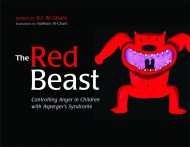Super Shamlal – Living and Learning with Pathological Demand Avoidance
On sale
21st October 2019
Price: £15.99
Selected:
Hardcover / ISBN-13: 9781787750562
Shamlal the Camel finds it almost impossible to do all the normal, everyday things that the other camels do. Her first word was ‘NO!’ and this is still the word she repeats the most through every day.
Luckily, Shamlal’s parents take her to a psychologist who explains that she has PDA, and gives her tips for how to live and learn with the syndrome.
This simple, illustrated storybook will help children aged 7-11 with PDA to recognise its features, and develop tools to support them. A helpful introduction for parents and carers explains how it feels to live with the panic attacks and general anxiety that are caused by living with PDA, and the appendices at the back provide useful strategies to be adopted at school and at home.
Luckily, Shamlal’s parents take her to a psychologist who explains that she has PDA, and gives her tips for how to live and learn with the syndrome.
This simple, illustrated storybook will help children aged 7-11 with PDA to recognise its features, and develop tools to support them. A helpful introduction for parents and carers explains how it feels to live with the panic attacks and general anxiety that are caused by living with PDA, and the appendices at the back provide useful strategies to be adopted at school and at home.
Newsletter Signup
By clicking ‘Sign Up,’ I acknowledge that I have read and agree to Hachette Book Group’s Privacy Policy and Terms of Use
Reviews
This book is a beautifully crafted story to help children with PDA, their friends and siblings understand this complex condition. Key points are illustrated through a likeable character, and in an positive way which supports the emotional wellbeing of children with PDA and those around them.
Super Shamlal uses the unusual but powerful analogy of the hobbling of an Arabic racing camel to explain the restrictions of PDA. A sensitive and perceptive book, it is an excellent introduction to PDA for all those involved.
This latest gem from Kay Al-Ghani looks closely at one of the many layers of the onion that is the autism spectrum. She does it with the same respect, thoughtfulness and kindness she exemplified in her other books. Very touching story.
It is amazing how such a simple, captivating children's story can so eloquently describe Pathological Demand Avoidance to both families and teachers, as well as to the child who has PDA. The management strategies for home and school as described in this delightful book will be endorsed by psychologists and really appreciated by parents.




